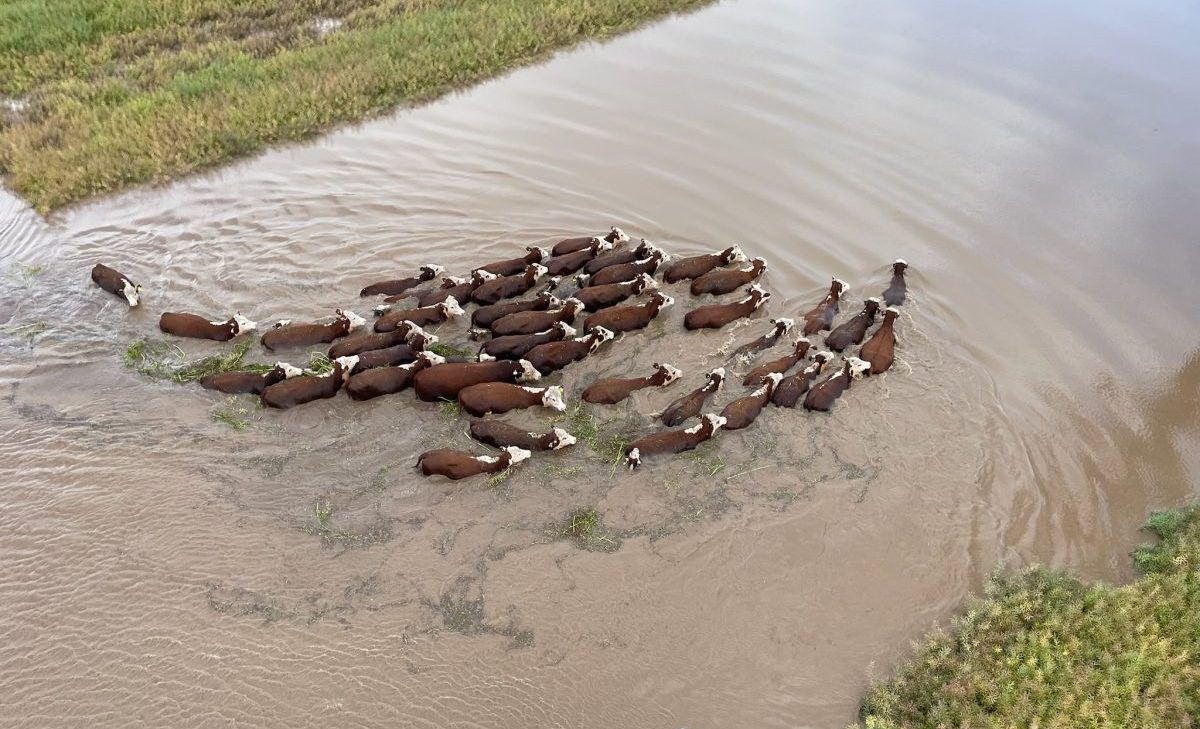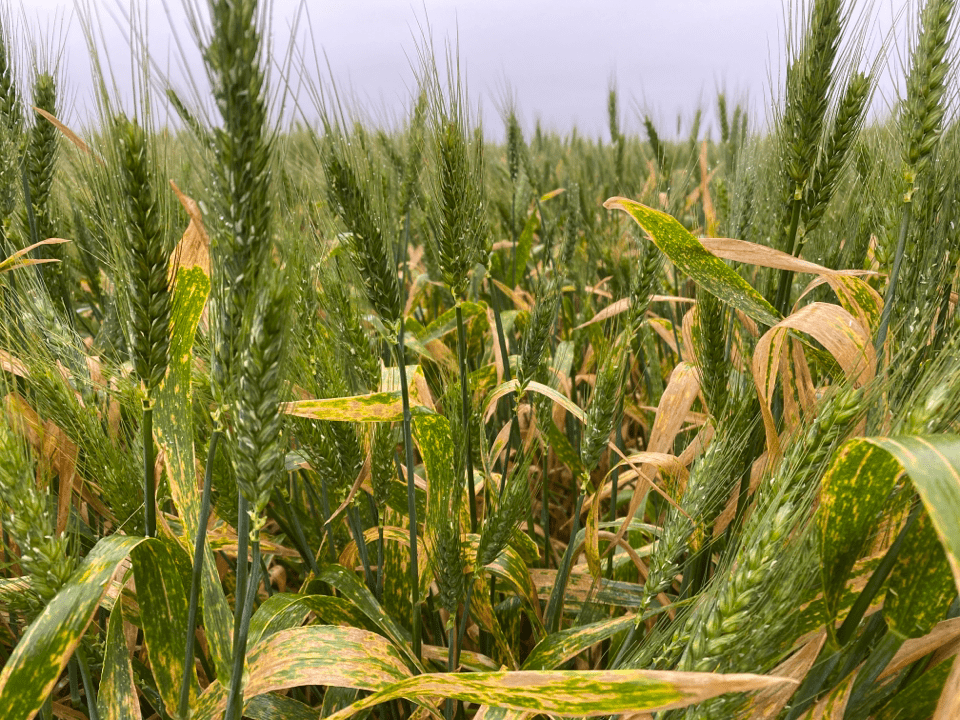
Cattle are moved through a canola crop to higher ground at Terry Hie Hie, south-east of Moree. Photo: Ed Tomlinson
WIDESPREAD quality downgrades and considerable yield losses are seen as unavoidable in winter crops across New South Wales and Victoria as floodwater spreads in the major growing regions of both states.
With a further 15-50mm of rain forecast to fall by next Monday, only crops on either the sloping eastern edge of the grainbelt, or the western edge spreading into Queensland are expected to escape the brunt of weather damage.
From a grain market perspective, a chronic shortage of high-protein wheat is already evident, with the APH2 wheat price bid at more than 40 per cent above the base-grade APW.
On the ground, farmers from Moree in far northern NSW to central Victoria are moving livestock and equipment to higher ground as communities and emergency services rally to protect property and relocate people at risk.
Wheat under pressure
In the wettest regions in NSW and Victoria, wheat test weights will likely be affected as crops are showing signs of stripe and head rust, and conditions remain too wet to allow further applications of fungicide.
Inundated areas are now looking at some yield losses due to lodging, with plains country in the wider Moree and Narrabri regions hard hit.
However, bumper yields in Queensland, and hopes that at least half the crop will jag protein of 11 per cent plus, should help to offset the impact of low protein across NSW.
Delta Ag Moree agronomist Rob Long said canola and cereals on slopes country, and in higher parts of low-lying paddocks, should be fit to harvest once ground dries out enough to support machinery.
“North-east of Moree, if crops were a later planting, they would still have reasonable potential, but anything west and south-west of Moree is just atrocious,” Mr Long said.
“When you get 180-240mm in one night, you can’t avoid damage.”
The impacted region includes: Bellata; Garah; Gurley; Mallawa; Rowena; Terry Hie Hie, and Rowena.
They are all renowned Prime Hard-growing districts, and a wet growing season has already limited growers’ ability to apply in-crop nitrogen.
“We were going to struggle to have big areas of Prime Hard anyway, but this rain has certainly put the kybosh on it.
“There’ll be plenty of APW, ASW, feed and GP grades.”
The north-west plains of NSW has seen a record canola area planted, and Mr Long said canola crops which have not been windrowed could well recover from the deluge.
“Anything left standing might be okay.
“The crop will be ready before the ground is ready, and it’s probably 10 days to two weeks from harvest now.”
Summer crop hopes
Planting of the 2023-24 cotton crop is under way in Queensland and northern NSW, and Mr Long estimates the wider region might have 20-30pc of its intended cotton area and 10-20pc of intended sorghum area planted.
“That will be a mixed bag of survival.”
Summer crops planted on irrigated country with the ability to drain are expected to have a good chance of survival, but rain in the coming week could thwart recovery.
He said cotton can be planted until late December, and mungbeans were also an option.
The flood peak in the Gwydir River has just passed in Moree, where more than 300 houses have been inundated and the clean-up is under way.
“Everyone in Moree’s got their mops and buckets out.”
Victoria’s crops filling
Flood impacts are being seen on low-lying country in the Macquarie, Lachlan, and Murrumbidgee valleys in NSW, and in Victoria also.
At Horsham in Victoria’s Wimmera, Sparke Ag agronomist Matthew Sparke said rust was prevalent in some cereal crops, and will have an impact on testweights.
“Wheat’s doing funny things,” Mr Sparke said.
“It’s not filling grain, and there’s plenty of stripe rust and pigmentations.”
He said stripe rust had the potential to cause screenings issues through pinching some grains in the head.
However, many of Victoria’s are late enough to still be filling.
Parts of northern Victoria including Echuca and Kerang are being hard hit by flooding concentrated in the Murray and Lodden valleys, primarily dairying and fodder-cropping country, and some homes, businesses and farms have been inundated.
Crops in the Victorian Mallee are likely to struggle to exceed 11pc protein due to the recent wet conditions, with more rain forecast.
One trade source said while Hard or H2 exports out of NSW might be a bridge too far this year, Victoria was still on track to produce H2.
“Will there be H2 out of Victoria this year? Yes.
“Will there be protein out of NSW this year? No.”
As some consolation to exporters missing out on volume protein exports out of NSW, the source said competitively priced cargoes out of Canadian wheat of 12pc plus was priced only slightly above APW.
“The Canadians are flogging their heart out on high protein.”

A wheat crop inspected earlier this month and expected to yield 4.5t/ha shows signs of stripe rust. Photo: Grain Industry Association of Victoria
Wet drought
According to NSW Farmers, several agronomists have predicted the loss of at least 120,000 hectares of wheat in Moree, Narrabri and Walgett districts combined.
NSW Farmers Grains Committee chair Justin Everitt said some farmers were calling it a “wet drought”, and while it was unlikely, directly, to impact food prices in the short-term, there were a lot of growers who would be under pressure to try again next year.
“You spend all this money preparing your paddocks, sowing your crops, fertilising and spraying them, only to see them wiped out a couple weeks before harvest – it’s heartbreaking,” Mr Everitt said.
“It’s a big turnaround in fortune from the big bumper harvest ABARES was predicting a couple of months ago,” Mr Everitt said.
“We’ve had a huge crop across the state in those places where people could get on paddocks to sow, but now that’s all under threat too.
“If we don’t dry out soon, it will be financially disastrous for a lot of growers.”



HAVE YOUR SAY